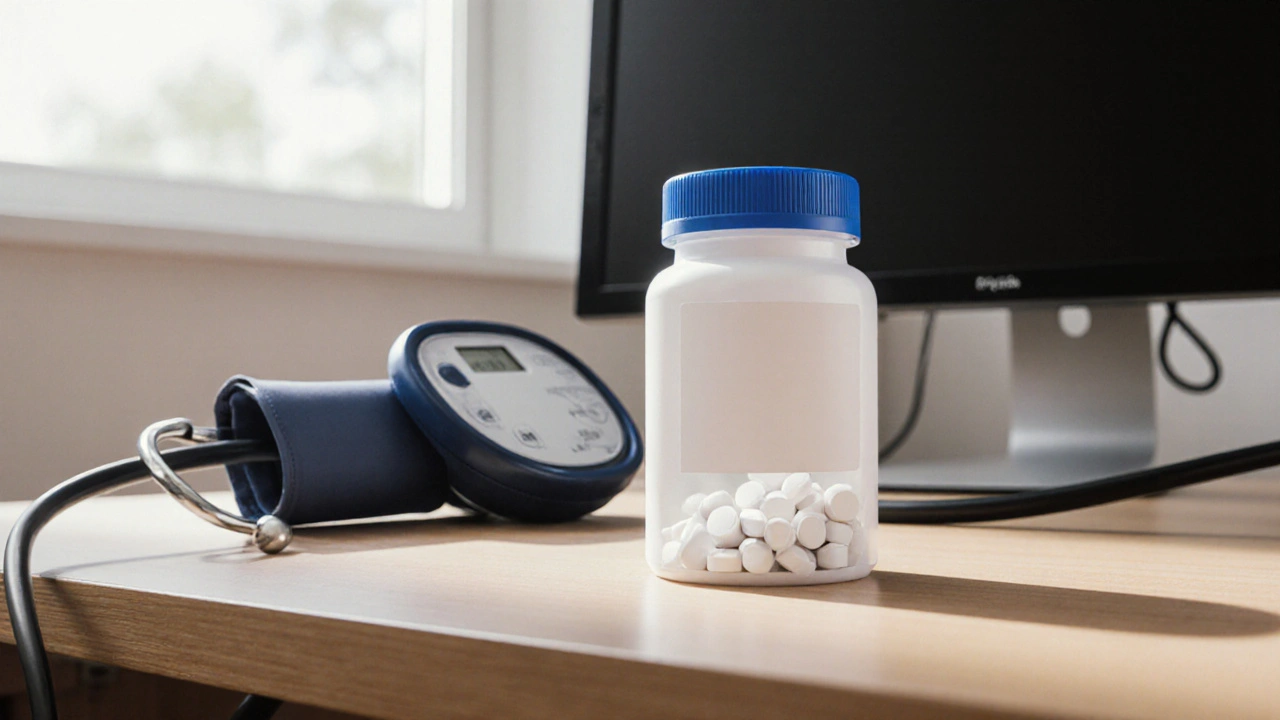Hypertension Drug Comparison Tool
Select medications and click Compare to see recommendations
| Drug (Generic) | Class | Typical Dose | Common Side Effects | Monthly Cost (US$) |
|---|---|---|---|---|
| Quinapril | ACE inhibitor | 10–40 mg | Cough, dizziness, elevated potassium | $5–$10 |
| Lisinopril | ACE inhibitor | 5–40 mg | Cough, headache, taste changes | $4–$9 |
| Enalapril | ACE inhibitor | 5–20 mg | Cough, fatigue, rash | $6–$11 |
| Ramipril | ACE inhibitor | 2.5–10 mg | Cough, dizziness, low blood pressure | $5–$12 |
| Losartan | ARB (Angiotensin II receptor blocker) | 25–100 mg | Leg cramps, low potassium, dizziness | $8–$15 |
| Valsartan | ARB | 80–320 mg | Headache, fatigue, stomach upset | $9–$18 |
| Amlodipine | Calcium-channel blocker | 2.5–10 mg | Swelling of ankles, flushing, palpitations | $7–$14 |
| Hydrochlorothiazide | Thiazide diuretic | 12.5–50 mg | Frequent urination, low potassium, gout flare | $3–$6 |
When you hear the name Accupril is a brand‑name ACE inhibitor (generic quinapril) used to lower high blood pressure, you probably wonder if it’s the right fit for you. Maybe your doctor suggested a switch, or you’re curious about cheaper or milder options. This guide breaks down Accupril, lines it up against other popular antihypertensives, and helps you figure out which pill matches your health goals, budget, and lifestyle.
Key Takeaways
- Accupril (quinapril) is an effective ACE inhibitor but can cause cough in up to 10% of users.
- For patients who tolerate ACE inhibitors, quinapril offers once‑daily dosing with solid blood‑pressure control.
- ARBs such as losartan and valsartan provide similar results with a lower cough risk.
- Combination therapy (ACEI/ARB+diuretic or calcium‑channel blocker) often works best for resistant hypertension.
- Cost varies widely; generic quinapril is cheap, while some newer ARBs may be pricier.
How Accupril Works - The ACE Inhibitor Basics
ACE inhibitors block the enzyme that converts angiotensin I to angiotensin II, a hormone that narrows blood vessels. By keeping vessels relaxed, the heart pumps more easily and pressure drops. Accupril’s quinapril is absorbed quickly, reaching peak levels in about an hour, and its effects last 24hours, which is why most doctors prescribe it once a day.
Top Alternatives to Consider
Below is a quick snapshot of the most common drugs people compare with Accupril. Each entry includes the drug class, typical daily dose range, the side‑effects most patients notice, and an approximate cost in U.S. dollars for a month’s supply of the generic version.
| Drug (generic) | Class | Typical Dose | Common Side Effects | Monthly Cost (US$) |
|---|---|---|---|---|
| Quinapril | ACE inhibitor | 10‑40mg | Cough, dizziness, elevated potassium | 5‑10 |
| Lisinopril | ACE inhibitor | 5‑40mg | Cough, headache, taste changes | 4‑9 |
| Enalapril | ACE inhibitor | 5‑20mg | Cough, fatigue, rash | 6‑11 |
| Ramipril | ACE inhibitor | 2.5‑10mg | Cough, dizziness, low blood pressure | 5‑12 |
| Losartan | ARB (AngiotensinII receptor blocker) | 25‑100mg | Leg cramps, low potassium, dizziness | 8‑15 |
| Valsartan | ARB | 80‑320mg | Headache, fatigue, stomach upset | 9‑18 |
| Amlodipine | Calcium‑channel blocker | 2.5‑10mg | Swelling of ankles, flushing, palpitations | 7‑14 |
| Hydrochlorothiazide | Thiazide diuretic | 12.5‑50mg | Frequent urination, low potassium, gout flare | 3‑6 |
Decision Criteria - What Matters Most?
Choosing a hypertension pill isn’t just about price. Here are the factors patients usually weigh, plus a quick rule‑of‑thumb for each.
- Side‑effect profile. If a persistent dry cough bothers you, ARBs (losartan, valsartan) are usually gentler.
- Kidney function. ACE inhibitors and ARBs both lower glomerular pressure; they’re beneficial for early kidney disease but need monitoring.
- Blood‑pressure goals. Some drugs (e.g., high‑dose lisinopril) have stronger evidence for reducing cardiovascular events.
- Comorbid conditions. Patients with heart failure often get ACEIs; those with diabetes may prefer ARBs for kidney protection.
- Cost & insurance coverage. Generic quinapril is cheap, but if your plan covers a specific ARB at $0, that becomes the winner.
Best‑Fit Scenarios
Below we match each drug to a typical patient profile. Use it as a quick reference when you talk to your prescriber.
- Accupril (quinapril). Good for people who need reliable once‑daily dosing and have no cough history.
- Lisinopril. Ideal when you’re also managing heart failure; the long‑track record is reassuring.
- Enalapril. Often chosen for patients with mild kidney impairment because of its modest potassium‑raising effect.
- Ramipril. Preferred for high‑risk cardiovascular patients; some studies link it to reduced stroke rates.
- Losartan or Valsartan (ARBs). Best if you’ve tried an ACE inhibitor and developed a cough or angio‑edema.
- Amlodipine. Works well as add‑on therapy when blood pressure stays high despite an ACEI or ARB.
- Hydrochlorothiazide. Good first‑line for low‑risk patients; often combined with an ACEI/ARB for stronger effect.
Potential Pitfalls & How to Avoid Them
Even the best drug can backfire if you overlook a warning.
- Pregnancy. ACE inhibitors and ARBs are unsafe in the second and third trimesters. Switch to methyldopa or labetalol if you become pregnant.
- High potassium diet. Bananas, oranges, and salt substitutes can push potassium too high when you’re on quinapril or an ARB.
- Sudden discontinuation. Stopping ACEIs abruptly may spike blood pressure. Taper under doctor supervision.
- Drug interactions. NSAIDs (ibuprofen, naproxen) can blunt the blood‑pressure‑lowering effect and stress the kidneys.

How to Talk to Your Doctor
Bring a short list of points to the appointment. It helps keep the conversation focused.
- Explain your current blood‑pressure readings and any side effects you’ve noticed.
- Ask specifically about cough risk if you’re on an ACE inhibitor.
- Mention any other meds, especially over‑the‑counter NSAIDs or supplements.
- Request a cost comparison if price is a concern; many pharmacies have discount cards.
- Confirm how often you need lab tests (creatinine, potassium) with the new drug.
Quick Checklist Before Switching
- ✅ Recent blood‑pressure log (at least 2 weeks)
- ✅ List of current prescriptions, OTC meds, and supplements
- ✅ Any history of cough, angio‑edema, or kidney disease
- ✅ Insurance formulary details (generic vs brand)
- ✅ Upcoming lab appointment for kidney function
Frequently Asked Questions
Can I take Accupril with a diuretic?
Yes. Combining an ACE inhibitor like quinapril with a thiazide diuretic (e.g., hydrochlorothiazide) is a common strategy for stronger blood‑pressure control. Your doctor will monitor potassium and kidney function closely.
Why do ACE inhibitors cause a cough?
ACE inhibitors block the breakdown of bradykinin, a peptide that can irritate the airway lining. In about 5‑10% of users, this leads to a dry, persistent cough.
Is there a difference between quinapril and lisinopril effectiveness?
Both lower systolic pressure by roughly 10‑12mmHg on average. Some studies suggest lisinopril may have a slightly longer half‑life, making it a bit more forgiving if a dose is missed.
Can I switch from Accupril to an ARB without a washout period?
A short 24‑hour gap is recommended to reduce the rare risk of angio‑edema. Your pharmacist can advise the exact timing based on your dosage.
What foods should I avoid while on quinapril?
Limit high‑potassium foods (bananas, potatoes, orange juice) and avoid using salt substitutes that contain potassium chloride. Also stay clear of excessive alcohol, which can increase dizziness.

Comments (10)